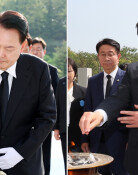Calls for S.Korea going nuclear need heavy dose of reality
Calls for S.Korea going nuclear need heavy dose of reality
Posted February. 15, 2013 05:55,
Amid mounting calls for South Korea to go nuclear following North Koreas latest nuclear test, President Lee Myung-bak told The Dong-A Ilbo in an exclusive interview Thursday, I assess such views highly in that they represent patriotic views, and I do not think that such calls are entirely wrong...However, it`s premature and not right for the (South Korean) government to discuss nuclear armament because its ultimate goal is to have Pyongyang give up its nuclear program through international cooperation. The original meaning of premature suggests that something is necessary when the time is right, if not now. The outgoing presidents use of the word leans more toward no, however.
The South Korean peoples reactions to the nuclear test are clearly different from those after the previous two tests. Pyongyangs atomic muscle has grown much stronger than in the past, with the increasing threat of deployment. In the wake of the latest test, even opposition lawmakers are publicly discussing Seouls need for nuclear arms. Rep. Chung Mong-joon of the ruling Saenuri Party said, When the thug in your neighborhood buys the latest machine gun, you cant say you`re defending your home by holding a stone in your hand. You need nuclear deterrence.
Advocates of a nuclear South Korea have two main arguments. The first is that Seoul needs nuclear weapons to create military symmetry with Pyongyangs nuclear threat. If the North deploys nuclear weapons, South Korea will undoubtedly face the biggest threat in its history. Pyongyangs claim that its nuclear weapons are targeted at the U.S. is nothing but rhetoric. Even if they were, the primary target would still be the South. In that sense, South Korea should also pursue nuclear armament for self-defense.
The second premise is that South Korea should spur North Korea, China and the U.S. to more effectively induce Pyongyang to scrap its nuclear program. Though Beijing is showing a different attitude than normal, it remains lukewarm about pressuring its communist neighbor. While Washington officially talks about making Pyongyang scrap its nuclear program and denuclearizing the Korean Peninsula, certain analysts say the U.S. internally has shifted its goal to prevent the spread of North Koreas nuclear weapons. Knowing that South Korea will find it hard to respond with nuclear weapons, North Korea is increasingly making blatant nuclear threats. So pro-nuclear proponents say Seoul needs atomic weapons to effectively get Pyongyang to get rid of its nuclear program and break the status quo.
The problem is that the South will find it nearly impossible to arm itself with nuclear weapons. This would mean secession from the Non-Proliferation Treaty and risking collapse of its decades-long alliance with the U.S. and isolation from the world. With the U.S. turning its back on the South, it would be extremely difficult for Seoul to endure this situation politically and economically. In addition, South Korea would no longer have any grounds for urging the North to scrap its nuclear program and pursue a nuclear-free peninsula. China also would not just stand by and watch South Korea go nuclear, and Japan could pursue rearmament.
The only realistic option for Seoul is to strengthen the extended nuclear deterrence of the U.S. through their bilateral alliance. The calls for South Koreas nuclear armament are understandable, but denuclearization of the peninsula is a premise that Seoul cannot defy. South Korea must seek realistic ways with the international community to make North Korea scrap its nuclear program.







